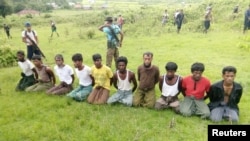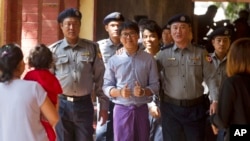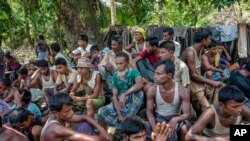Myanmar army chief Min Aung Hlaing has told military personnel in the country that they must obey the law, citing as an example the sentencing of seven soldiers for a massacre of Rohingya Muslim men that was the subject of a Reuters investigation.
In a speech at a military school in the country’s north, Min Aung Hlaing told soldiers they “must abide by the military codes of conduct and international laws and conventions”, according to a translation posted on his official Facebook page on Thursday.
“No one is above the law. Actions will be taken if someone breaks the law. The problems in Inn Din village ... were solved in line with the Geneva Convention and legal action was taken against military officers and other ranks who failed to respect the law,” said Min Aung Hlaing, in his first direct comment on the killings.
Seven soldiers were sentenced to 10 years in prison with hard labour this month for taking part in the massacre of 10 Rohingya men in the village of Inn Din, in northwestern Rakhine state, last September.
The massacre was being investigated by two Reuters journalists - Wa Lone, 32, and Kyaw Soe Oo, 28 - who were arrested in December and remain in custody accused of violating the country’s Official Secrets Act.
The authorities told Reuters in February the military opened an internal investigation into the killings independently and that it was unrelated to the Reuters reporters, who they said were accused of obtaining unrelated secret government papers.
The Rohingya men were buried in a mass grave in early September after being hacked to death or shot by Buddhist civilian neighbours and soldiers. Reuters published its story on the murders in February.
The killings were part of a larger army crackdown on the Rohingya, beset by allegations of murder, rape, arson and looting, unleashed in response to Rohingya militant attacks on security forces in late August.
Nearly 700,000 Rohingya Muslims have fled Myanmar as a result, according to United Nations agencies. The U.N. and the United States described it as ethnic cleansing - an accusation that Myanmar denies.
Min Aung Hlaing, one of the most powerful people in a country where the constitution requires the civilian government of Aung San Suu Kyi to share power with the military, reiterated in his speech the army’s position that the Rakhine operation was a legitimate counteroffensive against “Bengali terrorists”.













